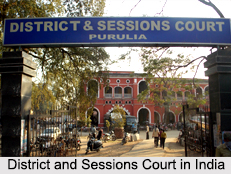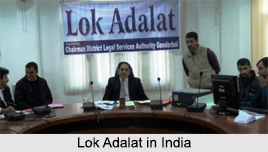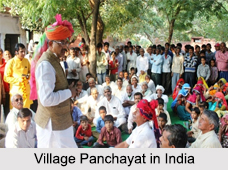 Subordinate Courts in India are courts which exist under the High Courts of the country. These courts are present at the level of districts in different states of India and lower, and have almost similar structure all over the country. Subordinate courts were established as a result of the enactments by the state governments in India, so their nomenclatures and designations vary from state to state. But it is important to note that with respect to organizational structure, there is uniformity among the subordinate courts. Each state is divided into judicial districts. The administrative control of the High Court over the district courts and other lower courts is complete in terms of postings, promotions, grants of leave, etc. over any person belonging to the judicial service of a state and holding any post inferior to the post of a judge. It is the district court, which hears appeals from the subordinate courts.
Subordinate Courts in India are courts which exist under the High Courts of the country. These courts are present at the level of districts in different states of India and lower, and have almost similar structure all over the country. Subordinate courts were established as a result of the enactments by the state governments in India, so their nomenclatures and designations vary from state to state. But it is important to note that with respect to organizational structure, there is uniformity among the subordinate courts. Each state is divided into judicial districts. The administrative control of the High Court over the district courts and other lower courts is complete in terms of postings, promotions, grants of leave, etc. over any person belonging to the judicial service of a state and holding any post inferior to the post of a judge. It is the district court, which hears appeals from the subordinate courts.
Types of Subordinate Courts in India
Subordinate courts in India are of various types. These courts are civil courts, criminal courts, people"s courts and Nyaya Panchayats. These courts are described below.

•Civil Courts: The highest civil court in a district is the Court of the District Judge. A civil court has both judicial and administrative powers. It can exercise both original and appellate jurisdictions. Below the Court of the District Judge are the courts of Sub-judge and Additional Sub-Judge and Munsif Courts.
•Criminal Courts: Criminal courts in India are the courts of the District and Sessions Judge, Additional Sessions Judges, Assistant Sessions Judge and the courts of the First Class Magistrates. At the district level, the apex criminal court is the Session Court.
•People"s Courts: People"s Court or Lok Adalat functions to settle dispute through pacification and cooperation. They are set up by the District Law Authority or the Taluk Law Authority. The decision taken by the Lok Adalat is binding on the parties concerned. There is no provision for appealing against the order of the Lok Adalat.
•Nyaya Panchayats: Nyaya Panchayats are administrative bodies, responsible for settling disputes at village level in India. Nyaya panchayats try to remain as simple as possible, procedurally. They are known to provide speedy and inexpensive justice to people.
Composition of Subordinate Courts in India
 The subordinate judiciary in each district is headed by a District and Sessions Judge. The usual designations of judges handling civil matters are District Judge, Additional District Judge and Civil Judge. Those handling criminal matters are designated as Sessions Judge, Additional Sessions Judge, Chief Judicial Magistrate, Judicial Magistrate, etc. The Governor of a state in consultation with the concerned High Court appoints the district judges. A person who is not a government servant should have at least 7 years of experience to become eligible for the position of a district judge (Article 233).
The subordinate judiciary in each district is headed by a District and Sessions Judge. The usual designations of judges handling civil matters are District Judge, Additional District Judge and Civil Judge. Those handling criminal matters are designated as Sessions Judge, Additional Sessions Judge, Chief Judicial Magistrate, Judicial Magistrate, etc. The Governor of a state in consultation with the concerned High Court appoints the district judges. A person who is not a government servant should have at least 7 years of experience to become eligible for the position of a district judge (Article 233).
Appointment of persons other than district judges to the judicial service of a state shall be made by the Governor in accordance with the prescribed rules. Besides the State Public Service Commission (SPSC), the High Court has to be consulted in the matter of such appointments (Article 234).
Functions of Subordinate Courts in India
Subordinate Courts in India deal with civil and criminal cases in accordance with their respective jurisdictions and administer the Code of Civil Procedure and the Code of Criminal Procedure. More specifically, civil courts are responsible for settling disputes related to marriage, divorce, land, property, etc. Criminal courts resolve matters related to crimes such as murder, robbery, etc. Lok Adalats are known to effectively settle money claims, partition suits, matrimonial cases, etc. Nyaya Panchayats have jurisdiction over civil and minor criminal cases.






